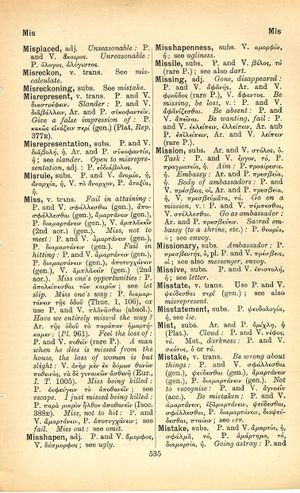miss: Difference between revisions
Τὸ γὰρ περισσὰ πράσσειν οὐκ ἔχει νοῦν οὐδένα → There is no sense in doing things beyond the usual measure
(CSV4) |
m (Woodhouse1 replacement) |
||
| Line 1: | Line 1: | ||
{{Woodhouse1 | {{Woodhouse1 | ||
|Text=[[File:woodhouse_535.jpg|thumb|link={{filepath:woodhouse_535.jpg}}]] | |Text=[[File:woodhouse_535.jpg|thumb|link={{filepath:woodhouse_535.jpg}}]] | ||
===verb transitive=== | |||
[[fail in attaining]]: [[prose|P.]] and [[verse|V.]] [[σφάλλεσθαι]] (gen.), [[ἀποσφάλλεσθαι]] (gen.), [[ἁμαρτάνειν]] (gen.), [[prose|P.]] [[διαμαρτάνειν]] (gen.), [[verse|V.]] [[ἀμπλακεῖν]] (2nd aor.) (gen.). | |||
[[miss]], [[not to meet]]: [[prose|P.]] and [[verse|V.]] [[ἁμαρτάνειν]] (gen.), [[prose|P.]] [[διαμαρτάνειν]] (gen.). | |||
[[fail in hitting]]: [[prose|P.]] and [[verse|V.]] [[ἁμαρτάνειν]] (gen.), [[prose|P.]] [[διαμαρτάνειν]] (gen.), [[ἀποτυγχάνειν]] (gen.), [[verse|V.]] [[ἀμπλακεῖν]] (gen.) (2nd aor.). | |||
[[miss one's opportunities]]: [[prose|P.]] [[ἀπολείπεσθαι τῶν καιρῶν]]; see [[let slip]]. | |||
[[miss one's way]]: [[prose|P.]] [[διαμαρτάνειν τῆς ὁδοῦ]] ([[Thucydides|Thuc.]] 1, 106), or use [[prose|P.]] and [[verse|V.]] [[πλανᾶσθαι]] (absol.). | |||
[[have we entirely missed the way]]? [[Aristophanes|Ar.]] [[τῆς ὁδοῦ τὸ παράπαν ἡμαρτήκαμεν]]; (Pl. 961). | |||
[[feel the loss of]]: [[prose|P.]] and [[verse|V.]] [[ποθεῖν]] (rare [[prose|P.]]). | |||
[[a man when he dies is missed from the house]], [[the loss of women is but slight]]: [[verse|V.]] [[ἀνὴρ μὲν ἐκ δόμων θανὼν ποθεινὸς]], [[τὰ δὲ γυναικῶν ἀσθενῆ]] ([[Euripides|Eur.]], ''[[Iphigenia in Tauris]]'' 1005). | |||
[[miss being killed]]: [[prose|P.]] [[ἐκφεύγειν τὸ ἀποθανεῖν]]; see [[escape]]. | |||
[[I just missed being killed]]: [[prose|P.]] [[παρὰ μικρὸν ἦλθον ἀποθανεῖν]] (Isoc. 388E). | |||
[[miss]], [[not to hit]]: [[prose|P.]] and [[verse|V.]] [[ἁμαρτάνειν]], [[prose|P.]] [[ἀποτυγχάνειν]]; see [[fail]]. | |||
[[miss out]]: see [[omit]]. | |||
}} | }} | ||
Revision as of 08:50, 20 May 2020
English > Greek (Woodhouse)
verb transitive
fail in attaining: P. and V. σφάλλεσθαι (gen.), ἀποσφάλλεσθαι (gen.), ἁμαρτάνειν (gen.), P. διαμαρτάνειν (gen.), V. ἀμπλακεῖν (2nd aor.) (gen.).
miss, not to meet: P. and V. ἁμαρτάνειν (gen.), P. διαμαρτάνειν (gen.).
fail in hitting: P. and V. ἁμαρτάνειν (gen.), P. διαμαρτάνειν (gen.), ἀποτυγχάνειν (gen.), V. ἀμπλακεῖν (gen.) (2nd aor.).
miss one's opportunities: P. ἀπολείπεσθαι τῶν καιρῶν; see let slip.
miss one's way: P. διαμαρτάνειν τῆς ὁδοῦ (Thuc. 1, 106), or use P. and V. πλανᾶσθαι (absol.).
have we entirely missed the way? Ar. τῆς ὁδοῦ τὸ παράπαν ἡμαρτήκαμεν; (Pl. 961).
feel the loss of: P. and V. ποθεῖν (rare P.).
a man when he dies is missed from the house, the loss of women is but slight: V. ἀνὴρ μὲν ἐκ δόμων θανὼν ποθεινὸς, τὰ δὲ γυναικῶν ἀσθενῆ (Eur., Iphigenia in Tauris 1005).
miss being killed: P. ἐκφεύγειν τὸ ἀποθανεῖν; see escape.
I just missed being killed: P. παρὰ μικρὸν ἦλθον ἀποθανεῖν (Isoc. 388E).
miss, not to hit: P. and V. ἁμαρτάνειν, P. ἀποτυγχάνειν; see fail.

